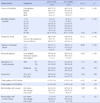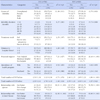Abstract
Purpose
The purpose of this study was to identify factors influencing depression of participants in the National Supporting Program for Infertile Couples (NSPI) who received a treatment of IVF (in vitro fertilization) or IUI (intra-uterine insemination).
Methods
Using the 2013 NSPI Satisfaction On-line Survey data, secondary data analyses were conducted on 830 cases of IVF and 706 cases of IUI. Descriptive statistics, independent t-test, χ2 test, and logistic regression were performed using SPSS/WIN 21.0.
Results
Logistic regression analysis showed that non-pregnancy status (OR=3.05), unexplained infertility (OR=4.29), relationship trouble with spouse (OR=3.57), and relationship trouble with the in-law family (OR=2.78) were significant factors predicting the depression level in the IUI treatment group. Non-pregnancy status (OR=5.28), childlessness (OR=1.92), financial support helpful hardly or not at all (OR=2.63), relationship trouble with spouse (OR=3.28), relationship trouble with the in-law family (OR=2.83), and unemployment (OR=1.60) were significant factors in the IVF treatment group.
Figures and Tables
Table 1
Comparison of Socio-demographic Characteristics of Respondents

Table 2
Comparison of Infertility related Characteristics and Family Support of Respondents

Table 3
Depression according to Socio-demographic Characteristics of Respondents

Table 4
Depression according to Infertility related Characteristics and Family Support of Respondents

Table 5
Factors related to Depression

References
1. Statistics Korea. 2013 birth statistics [Internet]. Seoul: Statistics Korea;2014. cited 2015 January 20. Available from: http://www.kostat.go.kr/portal/korea/kor_nw/3/index.board?bmode=read&aSeq=329406&pageNo=4&rowNum=10&amSeq=&sTarget=&sTxt=.
2. Centers for Disease Control and Prevention. Infertility FAQ's [Internet]. Atlanta: Centers for Disease Control and Prevention;2013. cited 2013 June 20. Available from: http://www.cdc.gov/reproductivehealth/Infertility/index.htm#1.
3. Hwang NM. The status of infertility and policy direction in Korea. Health Welf Policy Forum. 2003; 82:88–97.
4. Lee SH, Yoon TK, Choi YM, Kim KC, Lee YD, Hwang NM, et al. Report No.: 11-1352000-000833-10. Analysis and evaluation of the results of national supporting program for infertile couples in 2011. NSPI(National Supporting Program for Infertile couples) Evaluation Report. Seoul: Ministry of Health & Welfare, Chung-Ang University Hospital;2012. 12.
5. Boivin J, Griffiths E, Venetis CA. Emotional distress in infertile women and failure of assisted reproductive technologies: meta-analysis of prospective psychosocial studies. BMJ. 2011; 342:d223. DOI: 10.1136/bmj.d223.

6. Ramezanzadeh F, Aghssa MM, Abedinia N, Zayeri F, Khanafshar N, Shariat M, et al. A survey of relationship between anxiety, depression and duration of infertility. BMC Womens Health. 2004; 4(1):9. DOI: 10.1186/1472-6874-4-9.

7. Ogawa M, Takamatsu K, Horiguchi F. Evaluation of factors associated with the anxiety and depression of female infertility patients. Biopsychosoc Med. 2011; 5(1):15. DOI: 10.1186/1751-0759-5-15.

8. Lee JH. An analytical study on psychosocial predictors of depression and the effective psychosocial intervention program for reducing depression of infertile women being in infertility treatment [dissertation]. [Seoul]: Korea University;2013. 131.
9. Chang EY. Women's experiences of pregnancy after infertility [master's thesis]. [Seoul]: Ewha Womans University;1998. 86.
10. Lee YJ. An Ethnography on infertile women's grief in Korea [dissertation]. [Seoul]: Kyung Hee University;2008. 123.
11. Domar AD, Zuttermeister PC, Friedman R. The psychological impact of infertility: A comparison with patients with other medical conditions. J Psychosom Obstet Gynaecol. 1993; 14:45–52.
12. Hwang NM. Analysis on factors influencing depression of infertile women. Health Soc Welf Rev. 2013; 33(3):161–187.
13. Kim M. Stress, depression, and fetal attachment in pregnant women having infertility treatments. Korean J Women Health Nurs. 2014; 20(2):163–172.

14. Min SW, Kim YH, Cho YR. Stress, depression and factors influencing on quality of life of infertile women. J Korean Soc Matern Child Health. 2008; 12(1):19–32.
15. Valsangkar S, Bodhare T, Bele S, Sai S. An evaluation of the effect of infertility on marital, sexual satisfaction indices and health-related quality of life in women. J Hum Reprod Sci. 2011; 4(2):80–85. DOI: 10.4103/0974-1208.86088.

16. Kim JH, Shin HS. A structural model for quality of life of infertile women. J Korean Acad Nurs. 2013; 43(3):312–320.

17. Irwin M, Artin KH, Oxman MN. Screening for depression in the older adult: criterion validity of the 10-item center for epidemiological studies depression scale (CES-D). Arch Intern Med. 1999; 159(15):1701–1704. DOI: 10.1001/archinte.159.15.1701.
18. Verberg MF, Eijkemans MJ, Heijnen EM, Broekmans FJ, de Klerk C, Fauser BC, et al. Why do couples drop-out from IVF treatment? A prospective cohort study. Hum Reprod. 2008; 23(9):2050–2055. DOI: 10.1093/humrep/den219.

19. Domar AD, Rooney KL, Wiegand B, Orav EJ, Alper MM, Berger BM, et al. Impact of a group mind/body intervention on pregnancy rates in IVF patients. Fertil Steril. 2011; 95(7):2269–2273. DOI: 10.1016/j.fertnstert.2011.03.046.

20. Kim MO. The effect of a mind-body therapeutic program for infertile women repeating IVF treatment on uncertainty, anxiety, and implantation rate [dissertation]. [Seoul]: Yonsei University;2009. 93.
21. Bae KJ, Ro SO, Kim JA. The study of loneliness in infertile women. J Korean Acad Nurs. 1999; 29(6):1379–1391.

22. Gourounti K, Lykeridou K, Vaslamatzis G. Increased anxiety and depression in greek infertile women results from feelings of marital stress and poor marital communication. Health Sci J. 2012; 6(1):69–81.
23. Verhaak CM, Smeenk JMJ, van Minnen A, Kremer JAM, Kraaimaat FW. A longitudinal, prospective study on emotional adjustment before, during and after consecutive fertility treatment cycles. Hum Reprod. 2005; 20(8):2253–2260. DOI: 10.1093/humrep/dei015.





 PDF
PDF ePub
ePub Citation
Citation Print
Print


 XML Download
XML Download